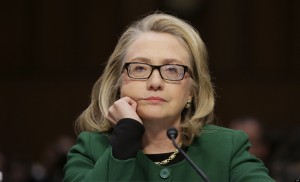By Victoria Toensing and Pete Hoekstra • New York Post
 The recent nonpartisan findings of the inspectors general of the State Department and the intelligence community — that former Secretary of State Hillary Clinton’s personal email server potentially contains “hundreds” of pieces of classified information — have significant national-security and counterintelligence implications.
The recent nonpartisan findings of the inspectors general of the State Department and the intelligence community — that former Secretary of State Hillary Clinton’s personal email server potentially contains “hundreds” of pieces of classified information — have significant national-security and counterintelligence implications.
As the former chairman of the House Intelligence Committee and former chief counsel for the Senate Intelligence Committee, we share these concerns.
Understandably, those who have never dealt with classified material — the general public — can be misled by “political spin.”
It’s important to put the questions about Clinton’s personal storage of government emails into the same context in which they are viewed by national-security professionals.
Clinton’s spokesperson vehemently and repeatedly claimed that press reports about her emails were “false.”
However, the most troubling allegation — that the emails on Clinton’s personal server were found to contain classified information — was not specifically refuted.
Probably because it’s not “false.”
Clinton tried to wiggle out of this problem by suggesting that the matter was overblown because the documents were not classified at the time she had custody and “various parts of the government” are “disagree[ing]” about whether the material should be classified. Not so.
In a random sampling of 40 emails, two inspectors general found that four individual emails, or 10 percent of the sample, contained classified information.
According to Office of Inspector General spokesperson Andrea Williams, those emails were “classified when they were sent and are classified now.”
Clinton’s spokesperson argued that Clinton couldn’t have been aware that the material was classified because it wasn’t specifically marked.
But that statement ignores how the process works. The reason government officials with security clearances are required to keep their correspondence on the appropriate government server is so the material can be vetted and classified prior to hitting “send” to an uncleared recipient.
The CIA goes to such great lengths to protect classified information that it even requires opposing counsel in legal cases to submit their briefs and exhibits for clearance before they can be filed.
Clinton’s argument is a sham. The reason the documents weren’t marked is because she never submitted them for clearance.
Moreover, Clinton should have been sufficiently aware of what was “classifiable.”
Senior government officials frequently discuss highly classified subjects in both formal and informal ways — sometimes without papers or notes containing markings. Think oral briefings, a common occurrence for government officials.
Nevertheless, they’re obligated to understand the nature of the information entrusted to them and to protect it appropriately.
Clinton benefitted from The New York Times first reporting that the referral was “criminal” rather than (as it later clarified) “a security referral made for counterintelligence purposes.” In classic Clintonian fashion, she pounced on the terminology, decrying erroneous reporting.
But that clarification is a distinction without a difference. Having been briefed on or involved in numerous counterintelligence investigations, we know there’s no such thing as a strictly “criminal” or “counterintelligence” referral.
When matters relating to significant improper handling of classified information are referred to the Department of Justice, they’re taken seriously and investigated by the FBI, where the matter could die or evolve into a prosecution.
It all depends on the facts uncovered during the investigation.
The attorney general’s Guidelines for Domestic Investigations make clear that counterintelligence investigations and criminal investigations can be one and the same:
“Activities within the definition of ‘threat to the national security’ that are subject to investigation under these Guidelines commonly involve violations (or potential violations) of federal criminal laws. Hence, investigations of such threats may constitute an exercise of both the FBI’s criminal investigation authority and of the FBI’s authority to investigate threats to the national security.”
Such investigations by their nature defy simple categorization despite attempts to “spin” them in black and white terms.
Protecting national security shouldn’t depend on politics or personality.
It hasn’t thus far in the Obama administration, which has vigorously prosecuted even the mishandling of classified information.
Consider Gen. David Petraeus. The Justice Department should apply the same standards to Clinton using the same rules that have been applied to everyone else. It could start by subpoenaing her server.
Pete Hoekstra is a former House Intelligence Committee chairman; Victoria Toensing is a former chief counsel for the Senate Intelligence Committee.